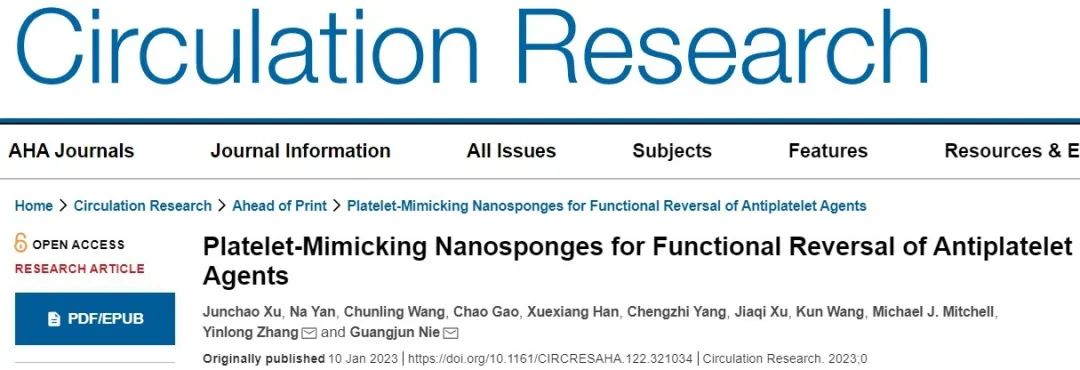预约演示
更新于:2025-05-07
CD41 x CD61
更新于:2025-05-07
关联
1
项与 CD41 x CD61 相关的药物作用机制 CD41拮抗剂 [+1] |
在研机构- |
原研机构 |
在研适应症- |
非在研适应症 |
最高研发阶段终止 |
首次获批国家/地区- |
首次获批日期1800-01-20 |
100 项与 CD41 x CD61 相关的临床结果
登录后查看更多信息
100 项与 CD41 x CD61 相关的转化医学
登录后查看更多信息
0 项与 CD41 x CD61 相关的专利(医药)
登录后查看更多信息
687
项与 CD41 x CD61 相关的文献(医药)2025-12-31·Platelets
Management of a twin pregnancy patient with Glanzmann thrombasthenia might be caused by a novel
ITGA2B
gene mutation (c.2822G>A): a case report and family investigation
Article
作者: Liao, Xiangcheng ; Li, Ping ; Huang, Yucong ; Qin, Aiqiu ; Liu, Liling ; Zhu, Ruikai ; Mo, Zhuning ; Yang, Zhigang
2025-03-01·Annals of Hematology
Epidemiological and clinical characteristics of children and young adults with Glanzmann’s thrombasthenia in upper Egypt: a multicenter cross-sectional study
Article
作者: Elmasry, Zahraa ; Atwa, Zizi T ; El-Sayed, Amr Abdallah ; Hassan, Mohmed A ; Khalifa, Gehan Lotfy Abdel Hakeem ; Youssef, Mervat A M ; Morgan, Dalia Saber ; Elsayh, Khalid I ; Hassan, Ebtesam Esmail
2025-03-01·Seminars in Thrombosis and Hemostasis
Glanzmann Thrombasthenia 10 Years Later: Progress Made and Future Directions
Review
作者: Nurden, Alan T. ; Nurden, Paquita
2
项与 CD41 x CD61 相关的新闻(医药)2025-02-27
·兰卫医学
当血液病遇上"技术革命"
血液病精准诊断的"黄金搭档":
MICM平台如何改写诊疗规则?
"医生,我的检查报告单为什么需要等这么久?"一位淋巴瘤患者的疑问道出了传统血液病诊断的痛点。
如今,随着MICM整合诊断平台的启用,这种等待从数周缩短到数天。这个由形态学(M)、免疫学(I)、细胞遗传学(C)、分子生物学(M)构建的MICM综合诊断平台,正在掀起血液病诊疗的精准化革命。MICM通过整合不同层面的检测信息,从宏观到微观,从细胞层面到分子层面,对血液疾病进行全面、深入的剖析,为临床医生提供准确的诊断结果和个性化的治疗建议。
一
揭秘MICM技术矩阵
形态学:百闻不如一见的 “火眼金睛”
形态学就像是在微观世界里的 “侦察兵”。通过显微镜,我们能够直接观察细胞的形态和结构,判断细胞是否出现异常,比如病态造血现象,或者异常细胞的出现。经验丰富的医生就如同微观世界的 “侦探”,从细胞的形状、大小、细胞核与细胞质的比例等细微之处,寻找疾病的蛛丝马迹。它是血液病诊断的基础,能够帮助医生初步判断病情,为后续更深入的检测指明方向。
免疫学:细胞身份的 “解码器”
免疫学利用流式细胞技术和免疫组化方法,如同细胞身份的 “解码器”。白血病细胞具有独特的免疫表型通过检测CD分子标记,它不仅能够区分90%以上的白血病亚型,还能发现仅占0.01%的微小残留病灶,通过这种方法我们可以区分急性和慢性白血病的不同亚型。临床数据表明,免疫分型让诊断准确率从60%大幅提升至95%。这对于准确诊断疾病、制定针对性的治疗方案非常关键。
特异:cMPO
幼稚:CD34,CD117,CD38,HLA-DR
粒单:CD33,CD13,CD11b,CD64,CD14,CD11c,CD15,CD16,CD10
巨核细胞:CD41,CD61,CD42b
红细胞:CD71,GlyA
细胞遗传学:染色体里的 “命运图谱”
细胞遗传学包括传统的染色体核型分析和荧光原位杂交技术(FISH)。染色体的结构和数量异常与许多血液疾病密切相关,数据显示,大约 60% 的血液肿瘤存在特征性染色体异常。传统的染色体核型分析可以帮助我们了解染色体的整体形态和数目变化,FISH技术则能够更精准地检测特定基因的位置和拷贝数变化。这些信息对于治疗方案的选择起着决定性作用。
分子生物学:基因层面的 “放大镜”
从PCR到NGS,分子诊断技术不断突破检测极限。NGS的高通量检测系统能够一次性筛查上百种融合基因亚型,将传统方法30%的漏检率降低至5%以下。数字PCR技术对BCR-ABL的检测灵敏度更是可以达到0.001%,让微小残留病灶(MRD)无所遁形。通过对基因层面的检测,我们能够深入理解疾病的发病机制,为靶向治疗提供有力的指导,从而提高治疗效果,减少不必要的治疗副作用。
二
行业变革:从单兵作战到系统整合
MICM 平台的优势在于它的全面性和精准性。单一的检测方法往往存在局限性,而 MICM 平台整合了多种检测技术,能够从多个角度对血液疾病进行评估。通过形态学的初步观察,免疫学的细胞分群,细胞遗传学的染色体分析,以及分子生物学的基因分型,医生可以全面了解患者的病情,制定出最适合患者的个性化治疗方案。
在临床实践中,MICM 平台已经取得了显著的成果。它提高了血液疾病的诊断准确率,减少了误诊和漏诊的发生。同时,基于精准的诊断结果,医生能够选择更有效的治疗方法,提高治疗效果,降低患者的痛苦和医疗成本。
三
未来图景:当AI遇见单细胞测序
随着医学技术的不断进步,MICM 平台也在不断发展和完善。未来,我们期待看到更多先进的检测技术融入 MICM 平台,进一步提高其诊断的准确性和效率。例如:数字PCR平台的持续发展,将让融合基因检测灵敏度提升至0.001%的同时成本降低60%,报告周期压缩至12小时,大大提高临床的可用性。单细胞测序技术正在突破肿瘤异质性难题,能解析白血病干细胞的基因表达谱,为根治性治疗提供新靶点。
精准医学时代的"诊断交响曲"
从显微镜到基因测序仪,从经验判断到数据驱动,MICM平台正在谱写血液病诊疗的精准乐章。正如黄晓军院士所言:"当形态学家的慧眼、免疫学家的精密、遗传学家的远见与分子生物学家的洞察完美融合,我们终将攻克血液肿瘤这座堡垒。"
兰卫医学专注于血液病诊断领域,构建了基于 MICM 的四大诊断平台,搭建起一套完善的产品矩阵。这个矩阵以荧光定量 PCR、数字 PCR、流式细胞术、二代测序等先进技术平台为核心,贯穿血液病诊疗的全过程。从血液病的亚型分型、预后评估,用药指导,微小残留病(MRD)监测,全面覆盖每一个关键环节的临床检测需求。
本文综合医学进展与临床实践,具体诊疗请遵医嘱;
图源来自于网络
本文由 市场中心 提供
免疫疗法
2023-01-15
·生物谷
该研究成功制备了一种具有抗血小板药物药效逆转功能的血小板仿生纳米海绵PLT-PFC,其表面保留了大部分血小板膜表面的药物靶点,可以竞争性结合抗血小板药物,有效逆转抗血小板药物的药效。
血栓性疾病严重威胁人类的生命健康,其发病率高居各种疾病之首,主要包括心肌梗塞、缺血性脑卒中、肺栓塞等。随着人们生活水平的不断提高,血栓性疾病的发病率呈上升趋势。
抗血小板药物是多种血栓性疾病长期防治的临床指南推荐一线药物,主要包括环氧合酶-1抑制剂、磷酸二酯酶抑制剂、二磷酸腺苷受体抑制剂、糖蛋白GPIIb/IIIa抑制剂、凝血酶受体抑制剂等。与抗凝治疗相似,长期的抗血小板药物治疗势必会给病人带来严重的出血风险,如皮下出血、消化道出血、颅内出血等,引起致死或致残等严重后果。此外,长期使用抗凝药物/抗血小板药物的病人遭遇车祸或者需要进行紧急手术时,对其体内的抗凝药物/抗血小板药物进行功能逆转可以为病人争取更多的安全治疗时间。
针对抗凝药物,临床上已经具有多种逆转剂可供选择,例如鱼精蛋白、Idarucizumab、Andexanet α、Ciraparantag、重组活化凝血因子VIIa、维生素K等。而抗血小板药物目前尚无已上市逆转剂,只有针对抗血小板药物替格瑞洛的一种单克隆抗体Bentracimab处于临床三期。临床常用的血小板输注策略,在多种抗血小板药物逆转方面效果不佳,并且血小板输注的数量需要严格限制以免带来额外的血栓风险。
2023年1月10日,国家纳米科学中心聂广军研究员团队和中国科学院大学纳米学院张银龙副教授团队合作在 Circulation Research 期刊发表了题为:Platelet-mimicking nanosponges for functional reversal of antiplatelet agents 的研究论文。
该工作针对长期服用抗血小板药物带来的出血风险,以及长期服用抗血小板药物的病人需要紧急介入手术等临床实际科学问题,提出了利用血小板膜纳米海绵对抗血小板药物特异性逆转的策略。与血小板输注不同,纳米海绵惰性内核无主动的血栓块收缩能力,因此在高剂量下无明显的体内致栓风险。
为了证明血小板膜纳米海绵制备过程中,血小板膜表面受体没有丢失,研究者首先通过纳米流式证明了纳米海绵表面P2Y12和αIIb/β3受体的保留。通过SDS-PAGE实验对血小板膜纳米囊泡和纳米海绵的全蛋白进行对比,发现纳米海绵保留了血小板膜的大部分蛋白。进一步地,通过蛋白质组学和免疫印迹分析,同样证明了纳米海绵保留了大部分血小板膜蛋白及重要的受体蛋白(CD41、CD61、P2Y12)。纳米海绵中没有发现管家蛋白GAPDH的存在,证实制备过程中,成功去除血小板内容物蛋白,保证所制备的血小板膜纳米海绵不具有诱导血栓形成的风险。
为了证明纳米海绵PLT-PFC对抗血小板药物具有高的亲和力,研究者通过等温滴定量热法和微量热泳分析等技术手段,分别测定了两者的Ka值和Kd值,实验结果表明,纳米海绵与替格瑞洛(Ticagrelor)、替罗非班(Tirofiban)两种抗血小板药物具有高的亲和系数和低的解离系数,为抗血小板药物的高效逆转提供了理论基础。研究者通过体外血小板聚集实验证明了纳米海绵PLT-PFC可以有效逆转Ticagrelor的抗血小板活性。
随后,研究者在小鼠体内评价纳米海绵PLT-PFC对Ticagrelor的功能逆转效应。通过尾静脉注射的方式提前给药Ticagrelor,随后注射纳米海绵PLT-PFC。通过高效液相色谱测定给药后不同时间点血液中Ticagrelor的浓度,并通过尾尖出血实验评价小鼠的止血功能。实验结果表明,PLT-PFC可以有效降低Ticagrelor曲线下面积,并恢复小鼠的止血功能。
最后,研究者评价了纳米海绵PLT-PFC在抗血小板药物引起的卒中出血转化模型中的作用。实验性脑卒中模型小鼠在造模之前连续三天给药Ticagrelor,造模前注射纳米海绵PLT-PFC,造模完成后给予溶栓治疗,通过核磁共振成像技术和Evans blue染料渗透实验评价小鼠脑出血和坏死面积。实验结果表明,抗血小板治疗可以增加卒中溶栓治疗的出血风险和脑梗死面积,而PLT-PFC可以有效逆转抗血小板药物的药效,降低出血风险,预防抗血小板药物诱导的脑栓塞面积增加。
综上所述,该研究成功制备了一种具有抗血小板药物药效逆转功能的血小板仿生纳米海绵PLT-PFC,其表面保留了大部分血小板膜表面的药物靶点,可以竞争性结合抗血小板药物,有效逆转抗血小板药物的药效。与血小板输注相比,惰性内核的引入可以有效降低血栓风险。PLT-PFC对抗血小板药物的功能逆转在尾尖出血模型及卒中出血转化模型中都得到了验证。该研究提出了一种广谱的抗血小板药物逆转策略,为临床抗血小板药物的功能逆转提供新思路。

临床3期
分析
对领域进行一次全面的分析。
登录
或

生物医药百科问答
全新生物医药AI Agent 覆盖科研全链路,让突破性发现快人一步
立即开始免费试用!
智慧芽新药情报库是智慧芽专为生命科学人士构建的基于AI的创新药情报平台,助您全方位提升您的研发与决策效率。
立即开始数据试用!
智慧芽新药库数据也通过智慧芽数据服务平台,以API或者数据包形式对外开放,助您更加充分利用智慧芽新药情报信息。
生物序列数据库
生物药研发创新
免费使用
化学结构数据库
小分子化药研发创新
免费使用
